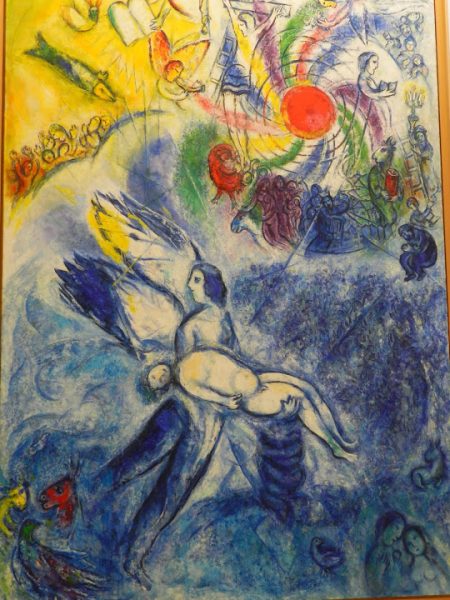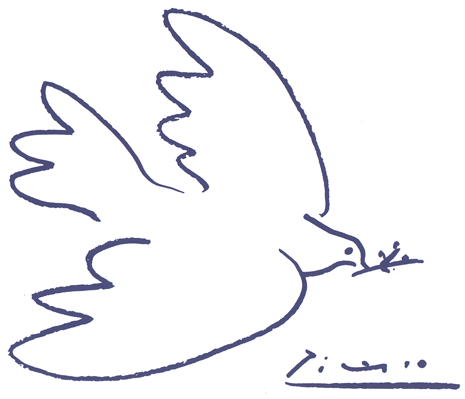
La Création de l’Homme, by Marc Chagall
For my part I know nothing with any certainty, but the sight of the stars makes me dream. ― Vincent Van Gogh
We don’t usually post our thoughts about spiritual matters, directly, on our blog but I (Tina) decided, ‘Oh, why not!’ So, here we go. Lately, I have received more than my usual share of recommendations via friends, acquaintances, and strangers of books and events promoting ‘spiritual’ ideologies that confound me and leave me wondering if people are really so desperate and lost that they will swim to any port in a storm. Perhaps this statement, which I’ve long mused over, is true: ‘When men choose not to believe in God, they do not thereafter believe in nothing, they then become capable of believing in anything.’― G.K. Chesterton
I decided to post a few of my own thoughts, cobbled together from years of practice as a psychotherapist, as well as studying and exploring various religious and philosophical paths. There are a few foundational principles which are the markers of any great philosophy or religion, and quite a few more which are poison. This list is by no means exhaustive, but represents my musings on this particular Sunday morning.
A worthy and noble religion or philosophical belief system:
- Encourages a noble aim (noble: reflecting high moral principles) based on the belief that life, while unavoidably filled with suffering, is also meaningful and worthwhile (i.e. does not promote nihilism).
- Teaches and exemplifies principles based on the ancient wisdom and traditions humans have developed over thousands of years, rather than their gutted and insubstantial offspring that have been flourishing since the 1970s, which only serve to feed our natural vanity and promote the cult of the self.
- Understands that human beings thrive when living a purpose-driven life and contributing to their communities—i.e., the focus is outwards, on others, rather than on oneself to the exclusion of others. Whether your community is made up only of your family and friends and workplace, or extends to the world at large, the outcome of following any path to ‘enlightenment’ should be to integrate you more fully with humanity, not to isolate you within a self-selected group that alienates you further from others. A sense of belonging and contributing are necessary to people who are not psychopaths, but they cannot be sustained in a vacuum.
- Recognises that happiness and contentment can only be achieved and sustained by living with purpose and caring for others. * Of course we want to be happy! But happiness is an outcome, not a goal, and it cannot be hit when aimed at directly. (As in archery, you have to aim a little off centre to hit the target.)
- Is neither selling you ‘secret, exclusive knowledge’, nor making you pay in order to advance to the next level of ‘enlightenment’, nor promising miracle cures for whatever ails you. (‘You will no longer have problems! You will never suffer pain again! You can manifest any life you want by changing how you think and opening yourself up to receiving abundance!’) I have seen this particular charlatanry sprouting like topsy, and I cannot stress this enough: These folks are frauds. It is sad to see otherwise intelligent people foundering in a cesspool whilst seeking transcendence. Sadder still, once they are sucked in, they do not welcome any suggestion that they may have been duped, so the rest of us stand by idly, watching them drown. I hope their inevitable collision with reality isn’t too painful when it occurs. **
- Does not encourage you to be self-absorbed, rigidly unforgiving, dishonest, hateful, cruel, or violent. We humans do this all on our own, quite naturally. We are forever trying to mediate between our reason and our passions, and our moral principles should give us a higher goal to reach for rather than encouraging us to wallow in our basest impulses.
- Whilst seeking the transcendent, nevertheless remains tethered to reality, the facts of which will never be erased via linguistic gymnastics and thought experiments. NB: 1. The earth is really and truly here. 2. We are living on it with other humans and other real species. 3. There are physical laws of the universe, which we are still struggling to comprehend; these, too, are real and not created or controlled by us. 4. As biological beings bounded by space and time, we and all other animals suffer and eventually die—whether we survive in spirit beyond death is outside the scope of this post. 5. Our thoughts do not create or sustain the universe. (That should be obvious to anyone who thinks, but apparently is not.)
Suffering is one of the most profound ways by which we know we are alive. It doesn’t get more real than that. The answer to pain is not tricking yourself into believing that it’s not real and trying to do so is, I believe, an egregious error against psyche and soul that will only amplify your pain and that of others. No path which denies reality and the pain of existence is going to take you anywhere worth going, because it’s predicated on a lie. While we do live our lives guided by our perceptions, emotions, and reason, we do not create reality. We are a part of a shared reality in which all creatures live and strive and suffer and die together. There is not only pain but also beauty and grandeur in living out that fundamental truth.
“People are like stained-glass windows. They sparkle and shine when the sun is out, but when the darkness sets in, their true beauty is revealed only if there is a light from within.” — Dr. Elisabeth Kübler-Ross

* For me, caring for others includes being loving custodians of our planet and its creatures.
** ‘We welcome illusions because they spare us emotional distress, and enable us instead to indulge in gratification. We must not complain, then, if now and again they come into collision with some portion of reality and are shattered against it.’ — Sigmund Freud, Thoughts for the Times on War and Death, (1915)
